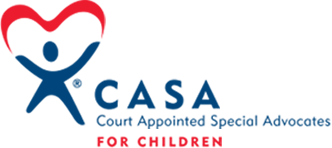Heart of CASA: October 2023
The Heart of CASA is a series to highlight the aspects of our volunteer work. Advocacy for a child in care covers several activities from court hearings to visits with a child to conversations with parents. Each month, we’ll share a story of a small (or big!) moment from one of our cases that exemplifies what advocacy can mean to a child and their families.
CONNECTION TO Education
Shortly after Evelyn* finished the fourth grade, she entered foster care. Fourth grade would be her last year in a traditional school for the next three years as she was moved to different residential treatment centers (RTC) and psychiatric hospitals. Removed at birth from her biological parents, Evelyn was adopted as an infant. When she was ten, her adoptive parents voluntarily relinquished their rights, which is known as a “Refusal to Accept Parental Responsibility,” due to reports of mental health concerns and behavioral issues.
While living at RTCs, Evelyn participated in computer-based learning programs due to Covid-19 restrictions and multiple placements. Her attendance record was spotty, and she struggled to comprehend the material and remain motivated. During a nine-month stay at a psychiatric hospital, she attended a school within the facility. However, if a student had any disciplinary issues, the child was removed from the classroom and school supplies were taken away; she continued to fall behind in her education when she was forced to miss class or did not have the supplies needed to complete her work.
Her Advocate, Lizzy*, recognized several issues contributed to Evelyn’s difficulties in school and began advocating for her to receive special education evaluations and more support. Evelyn was never in one school or program long enough to complete the evaluations. In the eighth grade, Evelyn started at a public school and completed the entire school year in one location. Despite the stability, Lizzy said Evelyn’s challenges in school escalated. She was unable to pass her STAAR tests or maintain passing grades. Along with academic struggles, Evelyn also had several behavioral problems.
Education AND THE CHILD WELFARE SYSTEM
According to Texas CASA’s Educational Advocacy Guidebook, students in foster care experience more educational instability than their peers, and they lag behind the general population in high school completion. The percentage of students in foster care who attended two or more schools in one school year (47 percent) is 6.5 times that of students not in care (7 percent). The percentage of students in foster care receiving special education services (24 percent) is almost three times that of students not in care (9 percent)
On top of the challenges due to multiple moves, children in care have experienced trauma and are grieving the tremendous losses of their relationships to families, friends, and communities. These traumatic experiences can lead to mental health issues, such as depression and anxiety. These additional challenges can significantly impact their performance in school and ability to engage in schoolwork and activities.
Right to Information
As a court-appointed special advocate, Lizzy knew she had the right to review Evelyn’s educational data and school information, communicate with school staff, and attend educational meetings. However, Lizzy ran into many challenges in accessing information and being included in meetings. After Evelyn’s RTC requested an evaluation for her behavior, Lizzy was invited to attend the review meeting. She wasn’t given a copy of the evaluation and the school said she didn’t qualify for special education.
Frustration grew as Lizzy recognized a lack of communication between the diagnostician, the school, and CASA. She asked questions and never received answers. She reached out to the attorney ad litem for Evelyn and asked to be appointed as Evelyn’s educational surrogate. An Educational Surrogate is an individual assigned to represent a student with a disability during the special education process.
Now, as Evelyn’s Advocate and Educational Surrogate, Lizzy attended the next Admission, Review, and Dismissal (ARD) meeting. An ARD in Texas is a meeting that determine a child’s eligibility for special education and related services and most of the major decisions about a child’s special education program. An Educational Surrogate for a child in care is included in that ARD meeting. The ARD committee includes a regular teacher, special education teacher, school representative (such as an assistant principal), diagnostician, and others with knowledge of the child (could be CPS caseworker, guardian ad litem, foster parent, or Educational Surrogate).
At the ARD, the school said that Evelyn didn’t qualify for special education because she didn’t complete the testing. She qualified for emotional disturbance. The school transferred her to Disciplinary Alternative Education Program (DAEP) so the district could start offering services based on her behaviors.
“We knew she had behavioral issues,” Lizzy said. “But a few weeks prior she told me that she didn’t know how to multiply and divide. She was in the eighth grade, and I’d been with her for three and a half years at that point.”
 None of the testing or schools had ever identified that Evelyn didn’t have basic math skills. The school wanted to say that Evelyn had an emotional disturbance but not a learning disability. They asked Lizzy to sign the Individualized Education Program (IEP), saying she agreed. Lizzy refused to sign. Instead, she sent several emails to school officials, including the foster care liaison, and the CPS Education Specialist, outlining the testing that had not been completed and what was missing from the evaluations. The issue was pushed higher up until a new diagnostician was brought in who assured the team that she would ensure that the testing was thorough for Evelyn.
None of the testing or schools had ever identified that Evelyn didn’t have basic math skills. The school wanted to say that Evelyn had an emotional disturbance but not a learning disability. They asked Lizzy to sign the Individualized Education Program (IEP), saying she agreed. Lizzy refused to sign. Instead, she sent several emails to school officials, including the foster care liaison, and the CPS Education Specialist, outlining the testing that had not been completed and what was missing from the evaluations. The issue was pushed higher up until a new diagnostician was brought in who assured the team that she would ensure that the testing was thorough for Evelyn.
The testing identified that Evelyn had a learning disability in math. The new diagnostician recognized Evelyn needed services that addressed her learning disability, not just her behavior. The diagnostician worked to get an IEP for Evelyn so she was set for success at her next district. She recognized that as a foster care child living in an RTC, there was a slim chance Evelyn would return to same school district the next year.
changes ahead
Meanwhile, Lizzy was also working hard behind the scenes to help find a suitable placement for Evelyn. The summer after eighth grade, she was placed with a kinship placement that Lizzy helped facilitate, and the child would move districts again. The new placement wanted to find a better learning environment for Evelyn that would help her get caught up academically. The solution she proposed was an online program offered through the school district. Initially skeptical due to her dismal history of online schooling, Lizzy researched the curriculum. She also talked to the new district, and officials proposed placing Evelyn in a classroom environment with children who had similar behavioral issues.
Lizzy knew that kind of environment wouldn’t work. The new placement worked from home and was committed to monitoring Evelyn’s progress in online learning. Lizzy and her new foster parent believed the online program would help Evelyn fill in her learning gaps from so many different schools and lack of previous support for her learning disability. Evelyn was onboard to try the online school with the support her new home. After CPS signed a waiver approving the program, Evelyn began the online school this fall.
slow and steady
The new school year has had some bumps, and Lizzy noted at a recent visit that Evelyn had several missing assignments. Her new placement had already hired a tutor to support Evelyn and help her organize her homework. Evelyn was proud to show Lizzy her artwork and schoolwork. With the support of her new foster parent, her tutor, and her Educational Surrogate and Advocate, Lizzy, Evelyn is making steady progress in her education.
Are you interested in learning more about how to become an Educational Surrogate for a child in foster care? Contact Kristy O’Neal, Educational Advocacy Coordinator, at Kristy@CASASpeaks4Kids.com. According to the Texas Education Agency, an Educational Surrogate is needed if the school district is unable to identify or locate (after reasonable efforts) a parent for a child with a disability, the child is a ward of the state, the child is an unaccompanied homeless youth, or the foster parent of a child is unwilling or unable to serve as a parent.
*Names changed for privacy
CHANGE A CHILD’S STORY TODAY. IMPACT OUR COMMUNITY FOREVER.
Learn more about becoming a CASA volunteer: VOLUNTEER or give online DONATE

